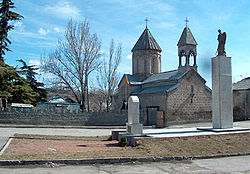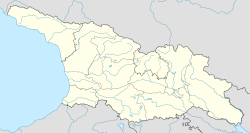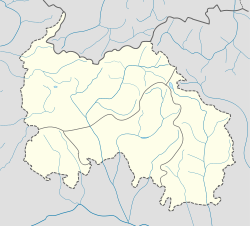- Tskhinvali
-
Tskhinvali Tskhinvali / Tskhinval / Chreba
ცხინვალი / Цхинвал / ЧъребаThe monument to the victims of the Georgian-Ossetian conflict. Location of Tskhinvali in Georgia Coordinates: 42°14′0″N 43°58′0″E / 42.233333°N 43.966667°E Country South Ossetia[1]/Georgia Established 1398 Area – Total 7.4 km2 (2.9 sq mi) Elevation 860 m (2,822 ft) Time zone Moscow time (UTC+3) – Summer (DST) Moscow summer time (UTC+4) Tskhinvali (also spelled Cchinvali or Cxinvali; Georgian: ცხინვალი [t͡sxinvɑli]; Ossetic: Цхинвал or Чъреба
 listen (help·info), Tskhinval or Ch'reba; Russian: Цхинвал(и)), is the capital of South Ossetia, a disputed region which has been recognised as an independent Republic by Russia, Venezuela, Nicaragua and Nauru, and is regarded by Georgia and the rest of the world as part of the Shida Kartli region within Georgian sovereign territory.[2][3][4]
listen (help·info), Tskhinval or Ch'reba; Russian: Цхинвал(и)), is the capital of South Ossetia, a disputed region which has been recognised as an independent Republic by Russia, Venezuela, Nicaragua and Nauru, and is regarded by Georgia and the rest of the world as part of the Shida Kartli region within Georgian sovereign territory.[2][3][4]It is located on the Great Liakhvi River approximately 100 km (62 mi) northwest of the Georgian capital Tbilisi.
Contents
Name
The name of Tskhinvali is derived from the Georgian Krtskhinvali (Georgian: ქრცხინვალი), literally meaning "the land of hornbeams",[5] which is the historical name of the city.[6] From 1934 to 1961, the city was named Staliniri (Georgian: სტალინირი), after Joseph Stalin. Modern Ossetians call the city Tskhinval (leaving off the final "i", which is a nominative case ending in Georgian); the other Ossetian (unofficial) name of the city is Chreba.[7]
History
The area around the present-day Tskhinvali was first populated back in the Bronze Age. The unearthed settlements and archaeological artifacts from that time are unique in that they reflect influences from both Iberian (east Georgia) and Colchian (west Georgia) cultures with possible Sarmatian elements.
Tskhinvali was first chronicled by Georgian sources in 1398 as a village in Kartli (central Georgia) though a later account credits the 3rd century AD Georgian king Asphagur of Iberia with its foundation as a fortress. By the early 18th century, Tskhinvali was a small "royal town" populated chiefly by monastic serfs. Tskhinvali was annexed to the Russian Empire along with the rest of eastern Georgia in 1801. Located on a trade route which linked North Caucasus to Tbilisi and Gori, Tskhinvali gradually developed into a commercial town with a mixed Jewish, Georgian, Armenian and Ossetian population. In the 1917 it had 600 houses with 38.4% Jews, 34.4% Georgians, 17.7% Armenians and 8.8% Ossetians.[8]
The town saw clashes between Georgian People's Guard and pro-Bolshevik Ossetian peasants during the 1918-20 period, when Georgia gained brief independence from Russia. Soviet rule was established by the invading Red Army in March 1921, and a year later, in 1922, Tskhinvali was made a capital of the South Ossetian Autonomous Oblast within the Georgian SSR. Subsequently, the town became largely Ossetian due to intense urbanisation and Soviet Korenizatsiya ("nativization") policy which induced an inflow of the Ossetians from the nearby rural areas into Tskhinvali. It was essentially an industrial centre, with lumber mills and manufacturing plants, and had also several cultural and educational institutions such as a venerated Pedagogical Institute (currently Tskhinvali State University) and a drama theatre. According to the last Soviet census (in 1989), Tskhinvali had a population of 42,934.
During the acute phase of the Georgian-Ossetian conflict, Tskhinvali was a scene of ethnic tensions and ensuing armed confrontation between Georgian and Ossetian forces. The 1992 Sochi ceasefire accord left Tskhinvali in the hands of Ossetians.
2008 South Ossetian War
Main article: 2008 South Ossetia WarMain article: Battle of TskhinvaliTskhinvali was shelled by the central Georgian government on 8 August 2008 with BM-21 "Grad" mobile artillery rocket systems in an attempt to regain control over the breakaway republic of South Ossetia. Many civilians were killed, while the majority of the population left the town and fled into North Ossetia-Alania. After the bombings, the Georgian army invaded the city in an attempt to gain control of the capital. The Russian army responded on the following day by moving its own forces into the city and counterattacking the Georgian army. On 10 August Georgian forces pulled out of Tskhinvali that was captured by the Russian army after intense fighting. The town was heavily damaged during the battle. The Jewish Quarter — one of the town's unique neighbourhoods was also reported to be destroyed.[12] Andrey Illarionov, who visited the town in October 2008, reported that Jewish Quarter indeed was in ruins, he also observed that the ruins were overgrown with shrubs and trees, which indicates that the destruction took place during 1991–1992 South Ossetia War.[13] However, Mark Ames, who was covering the Ossetian side of the story for The Nation, stated that Tskhinvali's main residential district, nicknamed Shanghai because of its population density (it’s where most of the city’s high-rise apartment blocks are located), and the old Jewish Quarter, were completely destroyed.[14]
Present
Currently, Tskhinvali functions as the capital of South Ossetia. Before the 2008 war it had a population of approximately 30,000. The town remained significantly impoverished in the absence of a permanent political settlement between the two sides in the past two decades.
The city contains several monuments of medieval Georgian architecture, with the Kavti Church of St. George being the oldest one dating back to the 8th-10th centuries, as well as Ossetian buildings.[15]
On August 21, 2008 a world-famous Russian conductor and director of the Mariinsky Theatre, of Ossetian origin, Valery Gergiev conducted a concert near the ruined building of South Ossetian parliament in memory of the victims of the war in South Ossetia.[16]
International relations
Twin towns — Sister cities
Tskhinvali is twinned with the following cities:
 Tiraspol, Transnistria[citation needed]
Tiraspol, Transnistria[citation needed] Sukhumi, Abkhazia[citation needed]
Sukhumi, Abkhazia[citation needed] Arkhangelsk, Russia[citation needed]
Arkhangelsk, Russia[citation needed]
Notes
- ^ De facto independent and recognized as such by Russia, however internationally recognized as part of Georgia.
- ^ http://en.rian.ru/world/20080904/116538071.html
- ^ http://eng.kremlin.ru/speeches/2008/08/26/1543_type82912_205752.shtml
- ^ http://en.rian.ru/world/20090910/156083204.html
- ^ (Russian)Словарь географических названий
- ^ (Russian)ИСТОРИЯ ЦАРСТВА ГРУЗИНСКОГО ("History of the Georgian Kingdom"), Вахушти Багратиони. Retrieved from vostlit.info on 24.08.2008
- ^ The Permanent Committee on Geographical Names (UK) (2007) "Georgia: a toponymic note concerning South Ossetia"
- ^ Jewish Online Encyclopedia
- ^ "Attacks damaged or destroyed 70% of buildings — Tskhinvali mayor". RIA Novosti. 12 August 2008. http://en.rian.ru/world/20080812/115983262.html. Retrieved 2008-08-12.
- ^ "Targeting civilians' homes". Russia Today. 12 August 2008. http://www.russiatoday.com/news/news/29914. Retrieved 2008-09-04.
- ^ "Грузины снимали свои преступления на видео". Vesti.Ru. 3 September 2008. http://www.vesti.ru/doc.html?id=206315. Retrieved 2008-09-03.
- ^ "Jewish Quarter targeted in Georgian offensive". Russia Today. August 21, 2008. http://www.russiatoday.com/news/news/29294.
- ^ Ситуация в Южной Осетии и Грузии
- ^ http://exiledonline.com/how-to-screw-up-a-war-story-the-new-york-times-at-work/2/
- ^ "Cathedral miraculously survives Georgian bombing". Russia Today. August 15, 2008. http://www.russiatoday.com/features/news/29031.
- ^ "Blitzed Ossetian city hosts classical concert". Russia Today. August 21, 2008. http://www.russiatoday.com/news/news/29286.
External links
Sites
- Site of Tskhinvali: information, news, video, photos and etc. — www.chinval.ru
Pictures
- Casualties in South Ossetia from Human Rights Watch
- Tskhinvali after the war from RIA Novosti
- 13 Aug 2008: Pictures of destroyed Tskhinvali after shelling of the city by Georgian troops on 8 Aug 2008 from Osinform
- "Kvartals old Tskhinval (photo)"(«Кварталы старого Цхинвала (фото)») — OSinform.ru
References
- Tsotniahsvili, MM. (1986) (in Georgian). History of Tskhinvali. Tskhinvali.
Coordinates: 42°14′N 43°58′E / 42.233°N 43.967°E
Districts Akhalgori/Leningor · Dzau · Tskhinval(i) · Znaur(i)
Towns Tskhinval(i) (capital) · Kvaisi/KvaisaAdministrative center Villages Avnevi · Badzhigata · Bagata · Bagiata · Britat · Buzala · Chagata · Cheliata · Chitata · Chrdilo-Chiprani · Dallag Erman · Duadonastau · Edis · Galuanta · Grubela · Gudzhabauri · Kabuzta · Kekhvi · Kemulta · Keshelta · Khetagurovo · Khikhata · Khodi · Khodz · Kola · Kotanto · Kroza · Kurta · Kusireti · Kvasatali · Kvemo-Achabeti · Kvemo-Bakarta · Kvemo-Koshka · Kvemo-Machkhara · Kvemo-Monasteri · Litsi · Muldarta · Nazigina · Raro · Rokata · Samkhret-Chiprani · Saritata · Sheubani · Shibonta · Shua-Ermani · Sidani · Sikhta · Sokhta · Tamarasheni1 · Tbet · Tibilaani · Tli · Tsamadi · Tsarita · Uchvarsi · Vaneli · Zar · Zemo-Achabeti · Zemo-Koshka · Zemo-Monasteri
1Ex-village Cities and towns in Georgia Autonomous Republic of Abkhazia Sokhumi · Akhali Atoni · Gagra · Gali · Gudauta · Ochamchire · Tkvarcheli · Bichvinta · Gantiadi · Gulripshi · Leselidze · Miusera.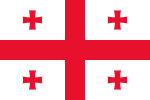
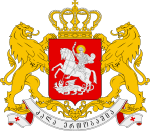
Autonomous Republic of Adjara Guria Imereti Kakheti Mtskheta-Mtianeti Samegrelo-Zemo Svaneti Samtskhe-Javakheti Akhaltsikhe · Akhalkalaki · Borjomi · Ninotsminda · Vale · Abastumani · Adigeni · Akhaldaba · Aspindza · Bakuriani · Bakurianis Andeziti · Tsagveriacha-Lechkhumi and Kvemo Svaneti Kvemo Kartli Shida Kartli Cities with local Government Capital City Autonomous Republic of Abkhazia Autonomous Republic of Adjara Guria Imereti Kakheti Mtskheta-Mtianeti Racha-Lechkhumi and Kvemo Svaneti Samegrelo-Zemo Svaneti Poti · Abasha · Zugdidi · Martvili · Mestia · Senaki · Chkhorotsku · Tsalenjikha · Khobi · Zemo AbkhaziaSamtskhe-Javakheti Kvemo Kartli Shida Kartli Categories:- Populated places in South Ossetia
- Cities and towns in Shida Kartli
- Tskhinvali
Wikimedia Foundation. 2010.

